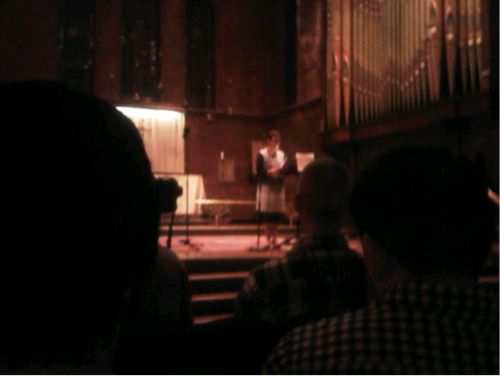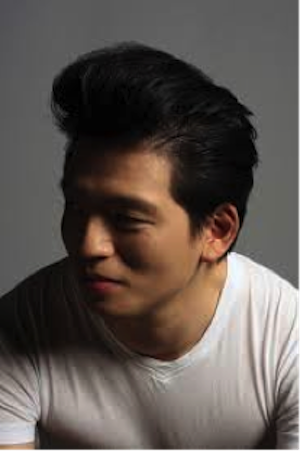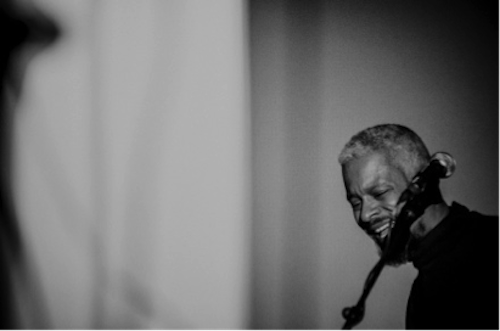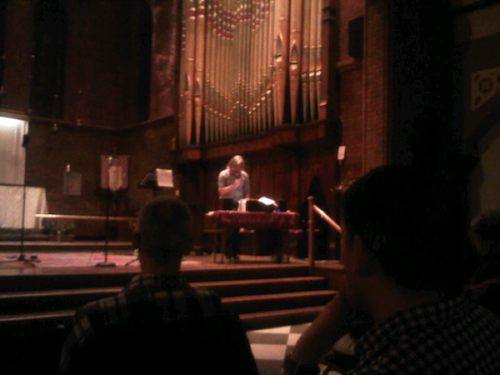Poetry, Northern/Southern Border, part III
BY Hoa Nguyen
In which I write about three newly minted poetry series that take place along the border between Canada and the U.S.A. Earlier, I spoke of a pop-up series in Detroit. My second dispatch featured Toronto’s Coven. My last report will cover ACROSS, a born-in-2014 series that also takes place in Toronto.
ACROSS takes place in a gorgeous space: St Stephen in-the-Fields, a church built in1858 in the Victorian Gothic revival style. No longer “in the fields,” it sits in the thick of urban density near Spadina and College. An Anglican church, it is renown for its inclusivity and a community weekend breakfast program that serves 7,000 meals annually to people in need. It is currently under the direction of priest Maggie Helwig who also acts as co-presenter of the series.
Curated by Margaret Christakos, the legendary Toronto community-maker, this new reading performance series is designed, in her words, to “reach from poetry communities outward to other genres and art forms, and proposes more intermingling of audiences, performance modes, creative positions and social identities” in order to “create some flux and simmer among writers, musicians, and intermedia artists interested in ideas of improvisation, site-specific performance, interdisciplinary form and collaboration. Readers are invited to explore new ways of opening up their work to the space and the audience. Each evening will propose some form of sonic/choral interaction.” Indeed, the concept for this series is an organic extension from the community-extending work Christakos began inside of her salon series Influency.
I spoke with Christakos about her series and her concept for ACROSS. In conversation she writes,
I'm always interested in how the solo writer/poet thinks about the choral and the collective, and sites where composition moves toward some degree of improvisatory practice, especially collaborative ones. I'd like to ask some fairly accomplished artists in other media to consider producing a site-specific, single occasion performance for the church space—to create a dialogue between his or her own practice and what becomes possible if the space and context are taken into account to prompt some new gesture. At this point the whole idea is to make the evenings exert some experimental daring, to move a little bit from the model where poets know exactly what they are going to do in public performance.
This vision unfolded in the series launch on May 9, 2014 and featured Beatriz Hausner, Tom Cho, Kaie Kellough, myself, and Gary Barwin.
Before the reading, right there on busy College Street, I found it symbolic and auspicious to see a large juvenile red-tail hawk swoop and fly from one roof line, soar across to another window frame ledge and then land in a tall sycamore before taking off once more. Something about this new flight and necessary resiliencies reminded me of the aspects of poetry that ACROSS invites: unexpected community shapings and convergences.

Poet and translator Beatriz Hausner selected poems of hers that had been translated into Spanish translation by Julio César, remarking how strange it is to read the Spanish editions (her first language) when the poems were written in English. She also read translations of her works in French translation by Patricia Godbout and Héloïse Duhaime and selections from her surreal trans-human Enter the Raccoon, published by Bookthug. Consider the opening:
And, just now, into my study has walked a human-size raccoon. He greets me and seems kind, despite the threatening teeth. I welcome him, mostly because he will provide warmth for the next few hours. It remains to be seen how long he can stay seated in the uncomfortable wicker chair I have set in the corner, the one covered with the elegant Oaxaca weaving, meant to be worn as a skirt by women in the Mixtec region. His breathing is distracting, perhaps because, as he has just informed me, he is suffering from an uneven heartbeat, wrought, as it is, by the insertion of an extraneous valve into one of the chambers of his heart. I tell him that these procedures are quite common nowadays. He seems tired, worn out. Perhaps Raccoon is simply echoing my own state of mind. Perhaps not. It’s hard to say.
Next to read was Tom Cho, an artist and the author of the collection of fictions Look Who’s Morphing, published to acclaim in Australia and New Zealand by Giramondo in 2009. In April 2014, Arsenal Pulp Press brought the book into print for a North American audience. Called “an important contribution to trans literature,” Look Who’s Morphing has been shortlisted for various awards. The pieces he read from the book explored the relationship of the stable with the changing, of humor with seriousness, mixing campy play with social identities and the occasional international Elvis impersonator. One set included a take on an Australian children’s game where messages are passed ear to ear; play it and the message may become Chinese. Or everyone playing becomes Chinese.

Kaie Kellough does not call himself a sound poet but “a word-sound systemizer.” Of his work, he writes “[my] systems originate in the inchoate swirl of vowels, consonants, misspellings, shapes, stammerings, and emerge as audio recordings, books, visual entities, volumes of letters, and performances that verse and reverse utterance.” For the event, he performed a sound collage of French, English and something in-between, mixing noise, sound, scales, utterances, and language. Powerful, multilayered, performed with virtuosity, his work focuses on formal experimentation and social engagement, how to create meaning from loss: loss of language, loss of self-possession, loss of intactness. When he finished performing, I realized I had been holding my breath for much of it.

Gary Barwin is a writer, composer, multimedia artist, and educator and the author of 17 books of poetry and fiction as well as books for both teens and children. He read from his latest book Moon Baboon Canoe (Mansfield Press, 2014). Read would be exactly the right terminology. I especially loved the opening mix that sampled sounds one finds inside of the Microsoft Word program: moody and spellbinding. He suggested that as creators of text perhaps we become a kind of shaman and witch woman. He closed with humorous anti-pastoral poems from Moon Baboon Canoe.

For future ACROSS events, Christakos hopes to stage evenings at two months intervals. When asked about what these may look like, she replies,
an array of performers whose poetics are interested in the fluctuations of certainty that come with being open to departures, relocations, beginnings-over, remixtures, movements from there to here, from where to somewhere else, especially those that stream through adjustments and refractions of linguistic communication in some way. I'm always interested in how the solo writer/poet thinks about the choral and the collective, and sites where composition moves toward some degree of improvisatory practice, especially collaborative ones.
A website devoted to the ACROSS events is planned which will house new linkages and archival material. Stay tuned.
Poet Hoa Nguyen was born in the Mekong Delta region of Vietnam and raised in the Washington, D.C., area...
Read Full Biography

